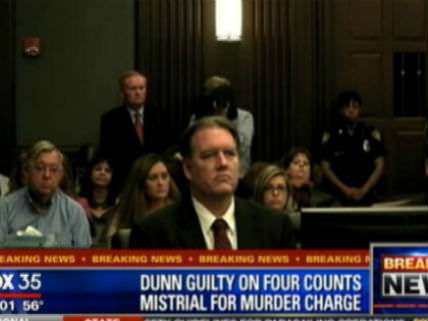Did Florida's 'Stand Your Ground' Law Hang Michael Dunn's Jury?

Last night Michael Dunn, the middle-aged software developer who got into a deadly argument over loud music at a Jacksonville, Florida, gas station in 2012, was convicted of attempted murder charges for firing a gun at an SUV in which four teenagers were sitting. The jury deadlocked on a murder charge related to the death of 17-year-old Jordan Davis, the passenger Dunn killed. According to The New York Times, the case was "the latest courtroom test for Florida's expansive self-defense statutes, including the so-called Stand Your Ground provision." But did the outcome of the trial actually hinge on any special feature of Florida's law, or is this another case, like the George Zimmerman trial last summer, where critics of the statute perceive a connection that does not really exist?
Without knowing what the holdout juror or jurors was/were thinking, it is impossible to say for sure. The right to "stand your ground" when attacked in a public place did not figure prominently in the trial, but Dunn's lawyer, Cory Strolla, did mention it during his closing argument, saying, "His honor will further tell you that if Michael Dunn was in a public place where he had a legal right to be, he had no duty to retreat and had the right to stand his ground and meet force with force, including deadly force." As in the Zimmerman case, the jury instruction concerning justifiable homicide mentioned that right, and it is more plausible in this case that it made a difference, since Dunn arguably could have driven away even if, as he claimed, Davis menaced him with a shotgun. (By contrast, Zimmerman's account of the fight that ended in Trayvon Martin's death, which was supported by substantial evidence and seems to have been accepted by the jury, precluded the possibility of retreat, since Zimmerman claimed Martin knocked him to the ground and was on top of him, smacking his head against the concrete.) Then again, even states that impose a duty to retreat make an exception when it cannot be done safely, and driving away from a gunman who has just threatened to kill you (per Dunn's account) would be pretty risky.
About that alleged gun: Police never found it, although Strolla argued that Davis' friends had time to ditch it and could have retrieved it later, before a thorough search of the area was conducted. The fact that Strolla said the purported weapon might have been a "lead pipe" or a "stick" did not inspire confidence in Dunn's story, which was further undermined by the testimony of Strolla's girlfriend, who was with him immediately after the shooting and during the following day. She said he never mentioned a shotgun to her.
Under Florida's self-defense law, the Times claims, Dunn "needed only to be convinced that he saw a shotgun, whether or not one was present." That is not quite right. Dunn had to reasonably believe Davis was threatening him with a shotgun. If his perceptions were colored by irrational preconceptions concerning the violent propensities of surly black teenagers listening to "thug music" (as seems plausible), his belief, even if sincere, was not reasonable. (Contrary to what the New York Times editorial board seems to think, the reasonable-belief standard is not unique to Florida or limited to states that recognize a right to stand your ground in public places.) In any case, the fact that Dunn fled the scene and did not call the police, who located him the next day via the license plate number seen by a witness, strongly suggests he did not really believe the shooting was justified. Furthermore, the fact that Dunn continued to fire on the SUV as it pulled away is consistent with the prosecution's theory that he acted out of anger rather than fear.
Given the fishy elements of Dunn's story and behavior, it may seem surprising that the jurors, who had the options of second-degree murder and manslaughter as well as first-degree murder, could not agree that his use of deadly force against Davis was not justified. But the prosecution had to prove beyond a reasonable doubt that Dunn was not acting in self-defense, and if one juror believed it did not meet that test, that would have been enough to block a verdict. The holdout would not have to be convinced that Dunn was telling the truth; he would merely have to think that believing Dunn was reasonable. The absence of a duty to retreat might have made a difference in that judgment, but it is not at all clear that it did.
Prosecutors plan to try Dunn again on the murder charge. Already he faces at least 20 years in prison under Florida's "10-20-life" rules for crimes involving guns, and he could receive a sentence as long as 75 years (a life sentence, effectively) if the judge decides that the terms for the various counts should be served consecutively. Dunn is scheduled to be sentenced the week of March 24.


Show Comments (37)